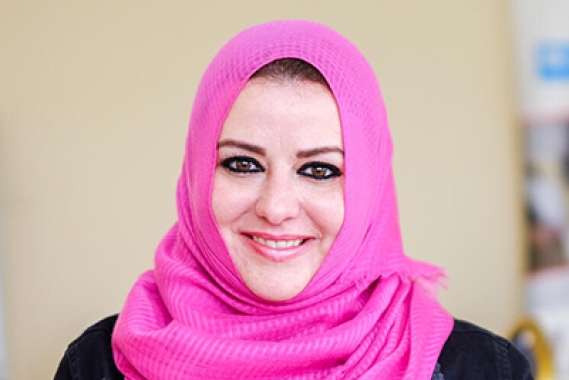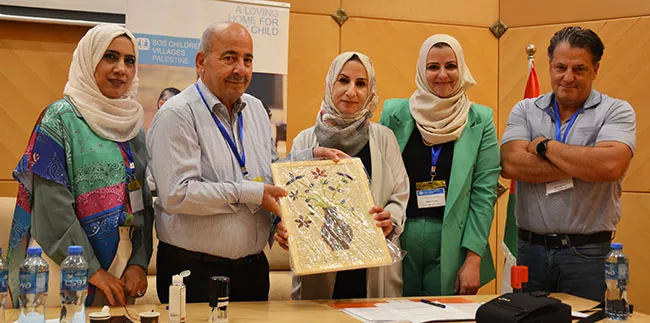“Women of SOS”: Alaa Fataftah, Social Worker, SOS Palestine
To mark International Women’s Day on 8 March 2022, we are sharing a 5-part series featuring professional and empowered “Women of SOS”. The Women of SOS are leaders and change-makers. They demonstrate the diversity of SOS programming around the world, and all that it takes to protect and care for children, strengthen families, empower communities, and provide emergency response.
Today, the spotlight is on Alaa Fataftah, Social Worker and Family Strengthening Program (FSP) Coordinator with SOS Children’s Villages Palestine in Bethlehem and Hebron since 2018. In this role, Alaa manages the FSP team to support vulnerable families and prevent family breakdown – work which involves empowering women and girls. In this interview, Alaa shares her experiences, her challenges, her love of her work, and her vision of a gender-equal world.

What was life like for you in Palestine as a young girl?
I am who I am today because of the family I grew up with. My father was a military man, and my mother studied Arabic, but she was a housewife. My two sisters, four brothers and I all got the support we needed from them. However, as all children in Palestine, we often suffered due to political stability and fears about our safety and security and that of our family. At the same time, we were a part of a social and cultural niche with customs and traditions that had to be respected.
Please share your educational journey.
I got my Bachelor degree with distinction in Guidance and Psychological Counseling from Hebron University. My university years were full of achievements and challenges: difficult political events sometimes led to road closures, so I had to walk long distances to reach my university. Not to mention the high risks of being on campus during a time of such unrest and military measures, which threatened everyone’s lives at the time. Despite these difficult times, I learned not to give up. Difficult situations like these made me realize the value of learning.
I remember a time when a military order closed my university, but even then, we never stopped learning. We were studying at nearby schools at night after the students there had left. We – my generation and I – believed that knowledge will help us build our future.
Straight after I completed my Bachelor degree, I started my Masters degree, and with strong support from my family. These degrees weren’t available in my town, so I joined the AL- Quds University in Jerusalem. The commute to and from my university was long and I often got back home late. I didn’t mind that, because I believed that this was the way that will lead me to being able to support my family. I earned my Masters degree and I hope to pursue a PhD in the future.
Where did you work before you joined SOS Palestine?
I worked for 12 years as a Psychology Counselor with United Nations Relief and Works Agency for Palestine Refugees. I also worked as a part-time instructor for two Palestinian universities.
It was in 2013 that I started to feel need to develop my skills, experience, and knowledge more, so I undertook the “Country Trainer on Positive Discipline in Everyday Parenting” certification with the University of Manitoba, delivered in Amman, Jordan. The Positive Discipline program was pioneered by Dr. Joan Durrant, a Child-Clinical Psychologist and Professor of Family Social Sciences at the University of Manitoba, Canada in partnership with Save the Children. The program brings together what is known about optimizing children’s healthy development, findings on effective parenting and child rights principles to give parents and other caregivers a framework for responding constructively to conflicts with children.
After 12 years of working with UNRWA, I felt it was time to move in a new direction, but I wanted to choose my next organization carefully. I knew SOS Children’s Villages was a professional organization providing quality services, so I was eager to apply. It has been a very good decision and I love my work to support vulnerable children and families.
Please describe a typical day in your work.
A typical workday of mine starts when I arrive to my office and have a cup of coffee with my colleagues. My team and I discuss the tasks everyone has for the day and any support they might need to achieve those tasks. Some days I work at the office, others I’m out in the field.
Through my role, I try my hardest to give my team support and help them overcome any difficulties or obstacles they might have faced through their direct work with the families. My tasks also include monitoring and evaluating our services to make sure we are providing quality services to families.

I also coordinate with a network of community-based organizations to build a strong support network for the families, to guarantee they have access to available services in their communities.
What are your daily challenges in this role?
My role at SOS Palestine involves a lot of effort in linking the humanitarian and administrative sides of the work. For instance, there are always decisions that must be taken for the benefit of the child and in that moment, I realize that any decision made also has a humanitarian side that must be taken into consideration.
My role also involves some difficulty in working with the families that we strengthen. Most of them are women-headed households in a society that puts a lot of limits on women. While their situations vary, all these women need support to care for their children, otherwise there is a risk of family breakdown.
And so, through our work, we try to empower these women to lead their families, while at the same preserving their societal and familial support. We work towards strong, able women that are accepted socially, and this takes a lot of patience and effort.
What keeps you motivated to continue?
Whenever I face a difficult situation during my job, I always remember my own 10-year-old son whom I care for with the help of my family. I think about how he deserves a better world and a better life, and just like I want a bright future for my son, I want the same thing for all other children as well.
This keeps me going and I never give up because I believe that through what I do, I am contributing to a change that will allow my child and other children to live in peace, happiness, and security.
Please share a fond memory, or the best day you’ve had in this role.
There are so many good memories that I have, but one memory dear to my heart is of a little girl, no more than 15 years old. Her dad had passed away and her mother re-married. Since the local law does not allow the mother to have custody of her child if she decides to re-marry, the young girl was in the custody of her uncle.
During a visit by our social workers to this new family, the girl revealed that her uncle had tried to sexually harass her. We immediately informed the relevant local authorities and official procedures were undertaken to allow the mother to immediately gain custody of the girl. We supported the mother and her daughter, and she is currently continuing her education safely. This experience taught me that the help we give can make an extraordinary difference in the life of a child.
Although we cannot change laws or beliefs, in this case, we succeeded in creating an exception that made a world of difference for this girl’s life. I’m always proud of our team’s work and this experience made me certain of the importance of our work and its vital role in the lives of many children.

What are the key challenges you see for girls and women in Palestine?
In my opinion, the biggest challenge girls face is the automatic preference given to boys by traditions and customs, and all behavior that follows because of that.
As for the women we work with, I see that they always take the bigger burden of raising their children but at the same time, they don’t have an equal right in making important family decisions. This burden is exacerbated if she is divorced.
Our work always revolves around empowering these women to provide them with the support they need to make their own decisions.
What does a “gender-equal” world look like, to you?
To me, gender equality means justice. I want a world where men and women can exercise their equal right to compete fairly over opportunities, and whoever deserves it most gets that opportunity. A world where being female is not a reason for the denial or loss of this opportunity, and a world where everyone supports one another, and a world which gives rights where they’re due.
_______________
About SOS Children’s Villages Palestine: SOS Children’s Villages Palestine is a member of SOS Children’s Villages federation. SOS Palestine works in cooperation with local communities and government agencies to support and empower marginalized and fragile families to protect children, build capacities, establish income-generating projects, and also to provide education, health, psychological and social support. SOS Palestine also assists children and youth to integrate into Palestinian society in West Bank and Gaza Strip through community homes or through their reintegration into their original families. Notably, SOS Children's Village in Bethlehem was the first SOS Children's Village to open in the Middle East in 1966. Learn more: www.sos-palestine.org
